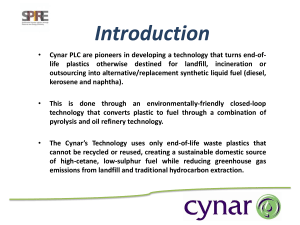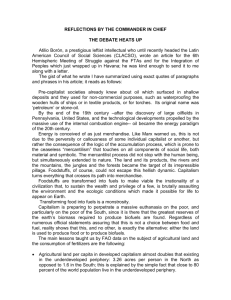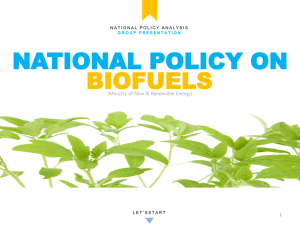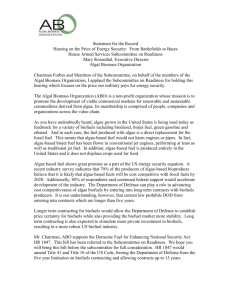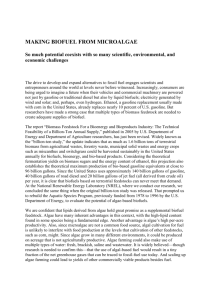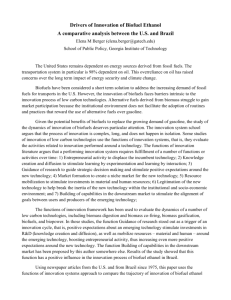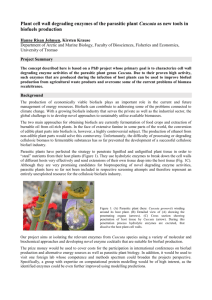Viability Studies of Biofuels
advertisement
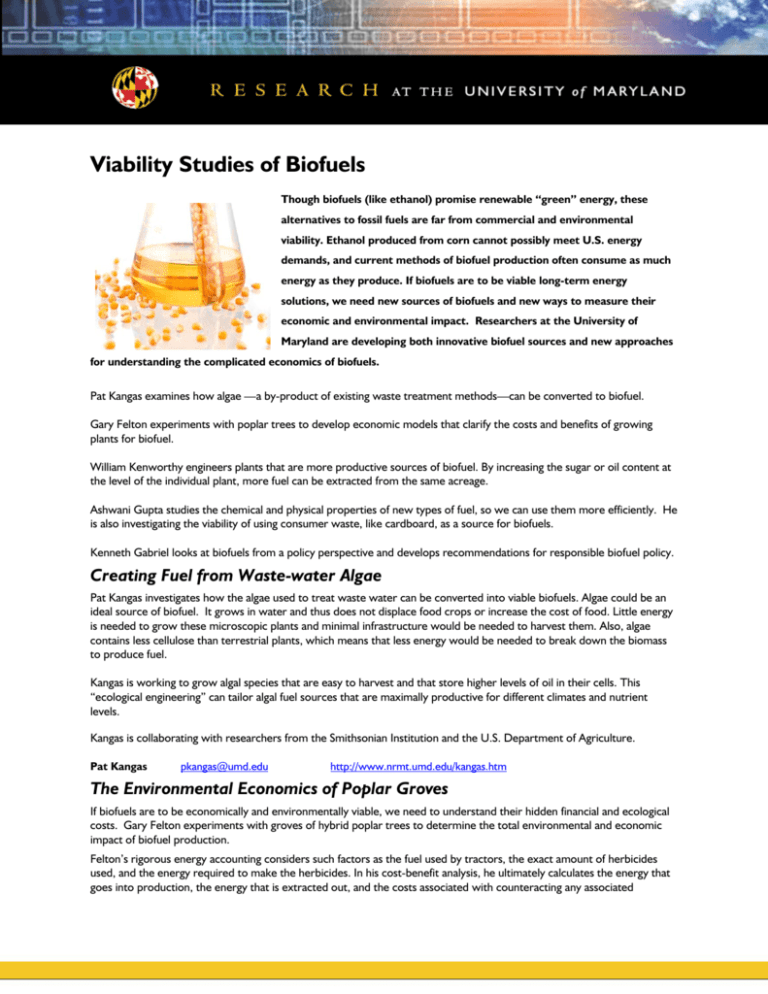
Viability Studies of Biofuels Though biofuels (like ethanol) promise renewable “green” energy, these alternatives to fossil fuels are far from commercial and environmental viability. Ethanol produced from corn cannot possibly meet U.S. energy demands, and current methods of biofuel production often consume as much energy as they produce. If biofuels are to be viable long-term energy solutions, we need new sources of biofuels and new ways to measure their economic and environmental impact. Researchers at the University of Maryland are developing both innovative biofuel sources and new approaches for understanding the complicated economics of biofuels. Pat Kangas examines how algae —a by-product of existing waste treatment methods—can be converted to biofuel. Gary Felton experiments with poplar trees to develop economic models that clarify the costs and benefits of growing plants for biofuel. William Kenworthy engineers plants that are more productive sources of biofuel. By increasing the sugar or oil content at the level of the individual plant, more fuel can be extracted from the same acreage. Ashwani Gupta studies the chemical and physical properties of new types of fuel, so we can use them more efficiently. He is also investigating the viability of using consumer waste, like cardboard, as a source for biofuels. Kenneth Gabriel looks at biofuels from a policy perspective and develops recommendations for responsible biofuel policy. Creating Fuel from Waste-water Algae Pat Kangas investigates how the algae used to treat waste water can be converted into viable biofuels. Algae could be an ideal source of biofuel. It grows in water and thus does not displace food crops or increase the cost of food. Little energy is needed to grow these microscopic plants and minimal infrastructure would be needed to harvest them. Also, algae contains less cellulose than terrestrial plants, which means that less energy would be needed to break down the biomass to produce fuel. Kangas is working to grow algal species that are easy to harvest and that store higher levels of oil in their cells. This “ecological engineering” can tailor algal fuel sources that are maximally productive for different climates and nutrient levels. Kangas is collaborating with researchers from the Smithsonian Institution and the U.S. Department of Agriculture. Pat Kangas pkangas@umd.edu http://www.nrmt.umd.edu/kangas.htm The Environmental Economics of Poplar Groves If biofuels are to be economically and environmentally viable, we need to understand their hidden financial and ecological costs. Gary Felton experiments with groves of hybrid poplar trees to determine the total environmental and economic impact of biofuel production. Felton’s rigorous energy accounting considers such factors as the fuel used by tractors, the exact amount of herbicides used, and the energy required to make the herbicides. In his cost-benefit analysis, he ultimately calculates the energy that goes into production, the energy that is extracted out, and the costs associated with counteracting any associated pollution. His research suggests that poplar trees are a viable and environmentally responsible biofuel alternative. Unlike other biofuel sources, poplars leave little nitrogen run-off and they can be grown on marginal land unsuitable for food crops. Felton also grows poplars fertilized with refined sewer waste. Five years of data suggests that the nitrogen-hungry poplars effectively absorb the sludge, taking up practically all the nitrogen and a substantial proportion of the phosphorus in the sewage. Thus, poplars could be used as both a source of biofuel and an eco-friendly pollution filter. Gary Felton gfelton@umd.edu http://www.bre.umd.edu/felton/ Selectively Breeding Soybeans for Biodiesel Production William Kenworthy uses classical plant breeding techniques to create more productive biofuel sources. In one of his selection programs, Kenworthy breeds soybean plants to produce higher levels of seed oil. This oil can be converted to fuel for diesel engines. An increased oil yield per bean means that more fuel can be produced from any acreage dedicated to biofuel production. By breeding a better soybean, Kenworthy is improving the viability of biodiesel for both today’s technologies and the engines of the future. Currently, small proportions of biodiesel are mixed into conventional diesel fuel as an additive, similar to the way that ethanol is added to gasoline to reduce emissions. Using biofuels in such small proportions requires no modification to existing engines and can stretch the supplies of fossil fuels. New engine designs could run exclusively on the biodiesel created from Kenworthy’s oil rich beans. William Kenworthy wk7@umail.umd.edu http://www.psla.umd.edu/research/NRSLResearchProjectInfo.cfm?ID=108 Understanding the Unique Chemistry of Biofuels Currently, we know much less about biofuels than we know about petroleum products. Ashwani Gupta investigates the physical and chemical properties of alternative fuels, including ethanol, so these fuels can be used more effectively. His research team studies different fuels’ vaporization properties, mixing properties, and energy yield. These studies could ultimately lead to new engines that are optimized to run on biofuels. Gupta and his group also study the energy conversion potential for untapped biofuel sources, such as domestic waste. They are currently examining the possibility of converting paper and cardboard into hydrogen fuel. It is also possible to produce liquid or solid fuel from the same kind of domestic wastes, and Gupta is working to understand the chemistry and physics of those processes. The various strands of Gupta’s work feed into his larger goal of developing efficient and environmentally benign ways to use fuel. Ashwani Gupta akgupta@umd.edu http://www.glue.umd.edu/~akgupta/ A Framework for Responsible Biofuel Policy Kenneth Gabriel, a scholar of public policy trained in chemistry, argues that sound science must guide biofuel policy. If his policy recommendations regarding biofuels are followed, this promising new source of energy will be efficient, effective, and environmentally sustainable. In a recent paper, Gabriel outlined the factors that must be weighed in developing biofuels. The cost of biofuels must take into account their effect on food prices, the energy density of fuels, the acreage of land that must be devoted to fuel production, and the costs required to grow and process the fuel. Fuel crops should have high energy density and should not crowd out other important crops. The resulting fuels should burn cleanly. Gabriel’s recommendations offer a framework for getting the biofuel challenge right. If biofuels are produced in a thoughtful and sustainable way, people and the planet will benefit tremendously. Kenneth Gabriel egabriel@umd.edu http://www.cpppe.umd.edu/

